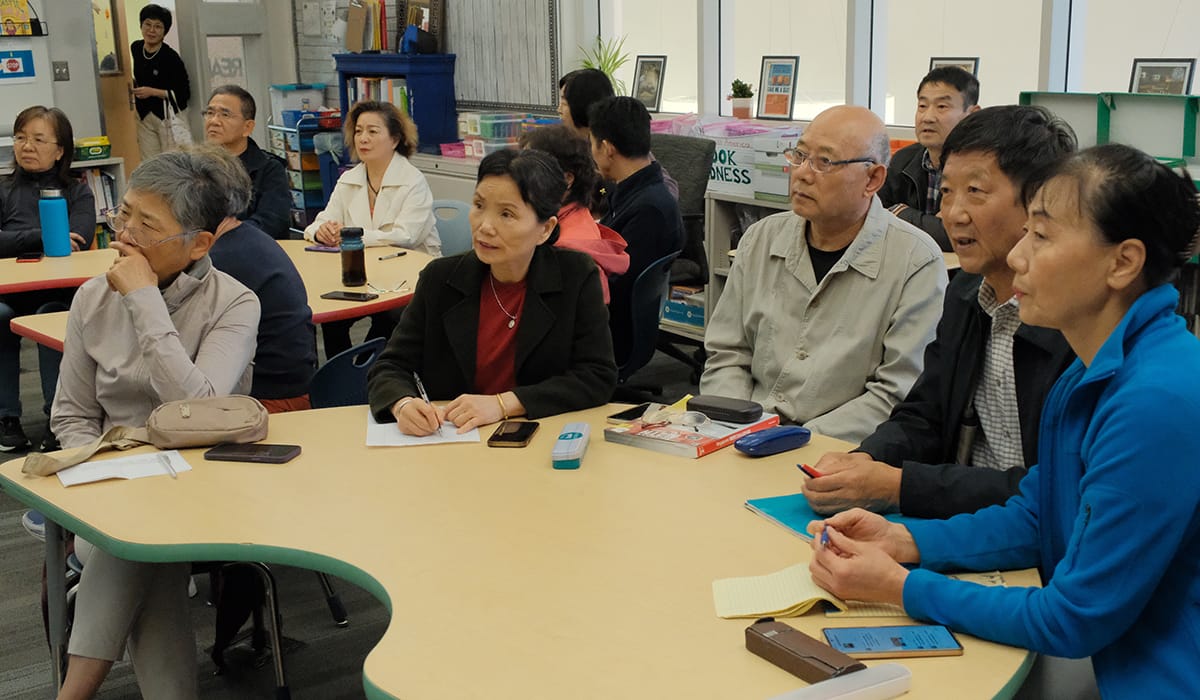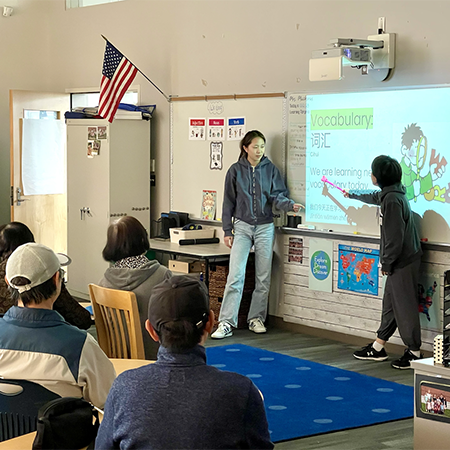The Keys to Connection: Bridging Intergenerational Gaps

Meet Daily Point of Light Award honoree Nicole Han. Read her story, and nominate an outstanding volunteer or family as a Daily Point of Light.
“Filial piety” is a term in Chinese culture that places high value on showing love and respect towards one’s parents, elders and ancestors. Nicole Han, a 17-year-old second generation American, has taken this to a new level with Heritage Bridges, the nonprofit she founded to bridge linguistic divides by developing and coordinating free intergenerational classes and events with a focus on empowering and celebrating senior immigrants.
As the executive director, she develops and oversees programs. She has also been teaching English for four years. Not only does her work reduce social isolation, but it can be vital to everyday functions.
Since its formation, the organization has garnered five global partnerships, with 600+ AAPI event attendees. Over 30 volunteer staff members run 18 chapters in eight different states, all overseen by Nicole, and have registered over 10,000 hours of service. Nicole’s chapter has over 150 current English students.
Nicole also heavily advocates for equitable access to language services as a board member of the Massachusetts Speaks Coalition, a governmental advocacy coalition for Bill H.3384/S.1990, An Act Relative to Language Access and Inclusion. This was, in part, inspired by an internship with a state representative that sparked her passion for advocacy and social justice.
What inspires you to volunteer?
Creating community change and reflecting on current events is motivating. I really do believe that youth volunteerism and youth power have the capability to create social reform.
What inspired you to get started with this initiative?
My grandma is Mongolian Chinese and emigrated to the United States in her late 70s. I recognized the devaluation of senior immigrants. There are few resources available to them. This drove my advocacy, because they hold the foundation of our identities, and it’s crucial for us to preserve and pass down their cultural legacies.

What are some of the challenges people face as they immigrate?
When someone immigrates to a new country, they often encounter the challenges of cultural assimilation–learning new social standards, adjusting to different community values and sometimes erasing long-held cultural practices or beliefs. Many experience social isolation due to the sudden change of setting and limited language proficiency that restricts their ability to interact and form new relationships. The sense of cultural loss is a huge problem. Finding a community where they feel acknowledged and known can be hard, and due to limited social networks and social opportunities, they ultimately have lower visibility.
Tell us about your volunteer role with Heritage Bridges.
In 2021, I started to teach English online. My grandma was my first student. I asked her if she had any friends who wanted to learn. Then, she asked people from her nursing home, and they contacted their friends. It started to reach multiple counties and, eventually, across the U.S. and Asia. I found volunteer staff to teach and established the in-person beginner English class and then the online beginner and advanced classes, using student input to inform lesson topics.
Besides the English program, we offer multiple public AAPI celebration galas and performances to celebrate and build pride in our identity. Right now, we co-host the events in the local community, but we’re looking towards expanding online. Anyone can join. I really like the lion dance at the annual Lunar New Year gala. A lot of children and seniors participate in the gala, and every time they see it, they all applaud and scream with joy.
We also offer empowerment workshops on things like Chinese calligraphy and confidence. Our only source of fundraising is selling red socks at AAPI celebrations and occasional pop-up events in downtown Boston, Chinatown. In multiple cultures, including Chinese, red signifies good luck. We’ve raised over $350.
What is Bill H. 3384, and how are you involved with that?
I interned with Massachusetts State Rep. Michael Day and attended hearings and briefings. I saw how people speak on behalf of a bill’s impact on communities. While there, I encountered Bill H. 3384, which would require public-facing state agencies to offer competent language translation. It would have a huge impact on senior immigrants dealing with the language barrier. One of my English students brought in prescriptions and asked me to help translate them into Mandarin. Going to the pharmacy is difficult without on-time translation services, and it can be fatal if someone misreads a prescription. I was so moved, I went to State Rep. Adrian Madaro, a co-sponsor of the bill. He said I could join the Massachusetts Speaks Coalition, which works directly with the bill. Now, I’m a board member and can openly advocate for people like my students. Right now, we’re collecting personal testimonies and quotes to schedule a hearing.
What’s been the most rewarding part of your work?
Seeing people smile when they finally grammatically structure a sentence correctly is the most rewarding thing. I love seeing our students improve their English.
Tell us about future partnerships, programs or events that you are excited about.
Our team is working on “Dear Elderly Immigrants,” a pen pal program inspired by the one in my elementary school. Senior immigrants will be able to connect with other senior English learners around the U.S. or abroad. We’ll take pictures of participants and have them write a few sentences about their hobbies, interests, where they’re from, etc. and create matches based on that. The goal is to create an exchange where people can exchange stories and lived experiences, and hopefully, alleviate perpetual isolation. We’re currently collecting a list of nursing homes, senior and English centers interested in collaborating.
Why is it important for others to get involved with causes they care about?
Heritage Bridges is part of my identity. I think you should advocate for your own particular needs or interests, because it could aid hundreds or thousands of other people in the same situation. Initially, it can feel daunting, but time spent researching and supporting a cause fuels passion and drive which, in turn, can yield profound effects on both local and broader communities.
Do you want to make a difference in your community like Nicole? Find local volunteer opportunities.
